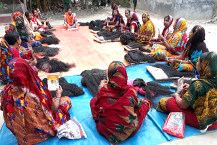 Nalta Village, nestled on the banks of the Kapotakkha River, relied heavily on fishing as the main source of livelihood. However, frequent flooding and siltation of the river posed significant challenges, leaving the villagers in dire circumstances. With their homes and livelihoods constantly at risk, the people of Nalta Village faced an uncertain future.
Nalta Village, nestled on the banks of the Kapotakkha River, relied heavily on fishing as the main source of livelihood. However, frequent flooding and siltation of the river posed significant challenges, leaving the villagers in dire circumstances. With their homes and livelihoods constantly at risk, the people of Nalta Village faced an uncertain future.
Recognizing the pressing need for change, a collaborative effort had been taken by Sustainable River Basin Management (SRM) project, with support from the donor organization Misereor. Their objective was to alleviate the suffering caused by waterlogging and empower the affected families to regain their economic stability and rebuild their lives.
The project team conducted a comprehensive survey, identifying 48 families among many who had been severely impacted by the waterlogging. The focus was on including widows, abandoned husbands, disabled individuals, and helpless women who were particularly vulnerable. Leveraging the expertise of the community, the project provided 26 kg of Korean high-quality fishing net thread to the families at a subsidized price of 10,000 BDT.
 Equipped with the necessary tools, the women of Nalta Village enthusiastically came together and formed groups to resume net-making activities. In addition to their traditional trade, they wisely invested their increased income in income-generating assets, which further bolstered their economic prospects. This newfound financial stability brought about positive changes in their lives.
Equipped with the necessary tools, the women of Nalta Village enthusiastically came together and formed groups to resume net-making activities. In addition to their traditional trade, they wisely invested their increased income in income-generating assets, which further bolstered their economic prospects. This newfound financial stability brought about positive changes in their lives.
With improved income, the families could now afford to provide proper education for their children, eradicating social ills such as dowry, child marriage, and violence against women from their society. Furthermore, by uniting as a group, they were able to avail themselves of government benefits, amplifying their collective strength and voice.
The success of the project extended beyond mere economic improvements. The revitalized Nalta Village fostered a renewed sense of hope and ambition among its residents. Dreams that were once distant and seemingly unattainable were now within reach. Some families aspired to purchase land and build permanent homes, while others sought to diversify their professions and explore new opportunities.
 The people of Nalta Village expressed their profound gratitude for steering their lives towards a brighter future. Through sustainable interventions, the community transformed their adversities into steppingstones to success, illustrating the potential for change and growth even in the face of challenging circumstances.
The people of Nalta Village expressed their profound gratitude for steering their lives towards a brighter future. Through sustainable interventions, the community transformed their adversities into steppingstones to success, illustrating the potential for change and growth even in the face of challenging circumstances.
As the ripples of this transformation spread, Nalta Village stands as a testament to the power of community resilience and the positive impact that can be achieved through inclusive development efforts. The success story of Nalta Village serves as an inspiration to other communities facing similar challenges, showcasing the potential for a brighter and more prosperous future through concerted efforts and sustainable interventions.
